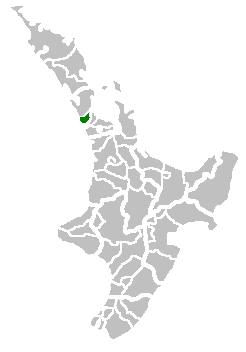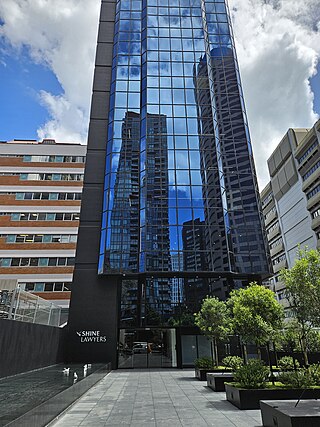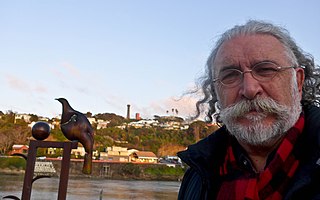
Waitakere City was a territorial authority in West Auckland, New Zealand; it was governed by the Waitakere City Council from 1989 to 2010. It was New Zealand's fifth-largest city, with an annual growth of about 2%. In 2010 the council was amalgamated with the other authorities of the Auckland Region to form the current Auckland Council.

New Lynn is a residential suburb in West Auckland, New Zealand, located 10 kilometres to the southwest of the Auckland city centre. The suburb is located along the Whau River, one of the narrowest points of the North Island, and was the location of Te Tōanga Waka, a traditional waka portage between the Waitematā and Manukau harbours.

Grey Lynn is an inner suburb of Auckland, New Zealand, located 3 kilometres (1.9 mi) to the west of the city centre. Originally a separate borough, Grey Lynn amalgamated with Auckland City in 1914.

Point Chevalier is a residential suburb and peninsula in the city of Auckland in the north of New Zealand. It is located five kilometres to the west of the city centre on the southern shore of the Waitematā Harbour. The suburb was originally a working-class area, with some state houses in the area, but over the past several decades the suburb has seen growth into becoming a middle-class suburb, with several redevelopment projects either completed or underway. Like most of the suburbs surrounding, Point Chevalier is known for its Californian style bungalows.

Newton is a small suburb of Auckland, New Zealand, under the local governance of the Auckland Council. It had a population of 1,641 in the 2013 census.

Westmere is a residential suburb of Auckland, in northern New Zealand. The Auckland Council provides local governance. On the southern shore of the Waitematā Harbour, this former peninsula is by road about 6 kilometres (4 mi) west of the city centre.

The Auckland isthmus, also known as the Tāmaki isthmus, is a narrow stretch of land on the North Island of New Zealand in the Auckland Region, and the location of the central suburbs of the city of Auckland and the central business district. The isthmus is located between two rias : the Waitematā Harbour to the north, which opens to the Hauraki Gulf / Tīkapa Moana and Pacific Ocean, and the Manukau Harbour to the south, which opens to the Tasman Sea. The isthmus is the most southern section of the Northland Peninsula.

Auckland Central is a New Zealand electoral division returning one member to the New Zealand House of Representatives. The electorate is currently represented by Chlöe Swarbrick, a member of the Green Party; she has represented the seat since 2020.

Sir George Matthew Fowlds was a New Zealand politician of the Liberal Party.

Auckland Council Libraries, usually simplified to Auckland Libraries, is the public library system for the Auckland Region of New Zealand. It was created when the seven separate councils in the Auckland region merged in 2010. It is currently the largest public-library network in the Southern Hemisphere with 55 branches from Wellsford to Waiuku. Currently from March 2021, the region has a total of 56 branches.
The former New Zealand parliamentary electorate on the western inner city of Auckland, was known as City of Auckland West from 1861 to 1890, and then Auckland West from 1905 to 1946.

The Hawke Scout hall is a building located on the edge of Coxs Bay, which is between the suburbs of Herne Bay and Westmere in Auckland, New Zealand. It is primarily used by Sea Scouts.

The Waitematā Local Board is one of the 21 local boards of the Auckland Council, and is one of the three boards overseen by the council's Waitematā and Gulf Ward councillor.

Christodoulos Evangeli Georgiou Moisa is a New Zealand poet, artist, photographer, writer, essayist and art teacher.

Basque Park is a north-facing reserve in Eden Terrace, a former working class suburb in central Auckland, the largest city in New Zealand. It is surrounded by Symonds Street, Newton Road, New North Road and the North Western Motorway.

Coxs Bay or Opoututeka is a bay located in the Waitematā Harbour, within the Auckland region of New Zealand. It is situated between the settlements of Westmere to the southwest and Herne Bay to the northeast, with Grey Lynn to the southeast. The bay is protected from the west by Te Tokoroa/Meola Reef, the end of one of the longest lava flows in the Auckland volcanic field.

Waitematā is a local government area covering the most central suburbs of Auckland, in New Zealand's Auckland Region. It is governed by the Waitematā Local Board and Auckland Council, and is located within the council's Waitematā and Gulf Ward.
Agnes Rosa TuiSamoa was a Pacific community organizer and social worker in Auckland, New Zealand.

West Auckland is one of the major geographical areas of Auckland, the largest city in New Zealand. Much of the area is dominated by the Waitākere Ranges, the eastern slopes of the Miocene era Waitākere volcano which was upraised from the ocean floor, and now one of the largest regional parks in New Zealand. The metropolitan area of West Auckland developed between the Waitākere Ranges to the west and the upper reaches of the Waitematā Harbour to the east. It covers areas such as Glen Eden, Henderson, Massey and New Lynn.


















